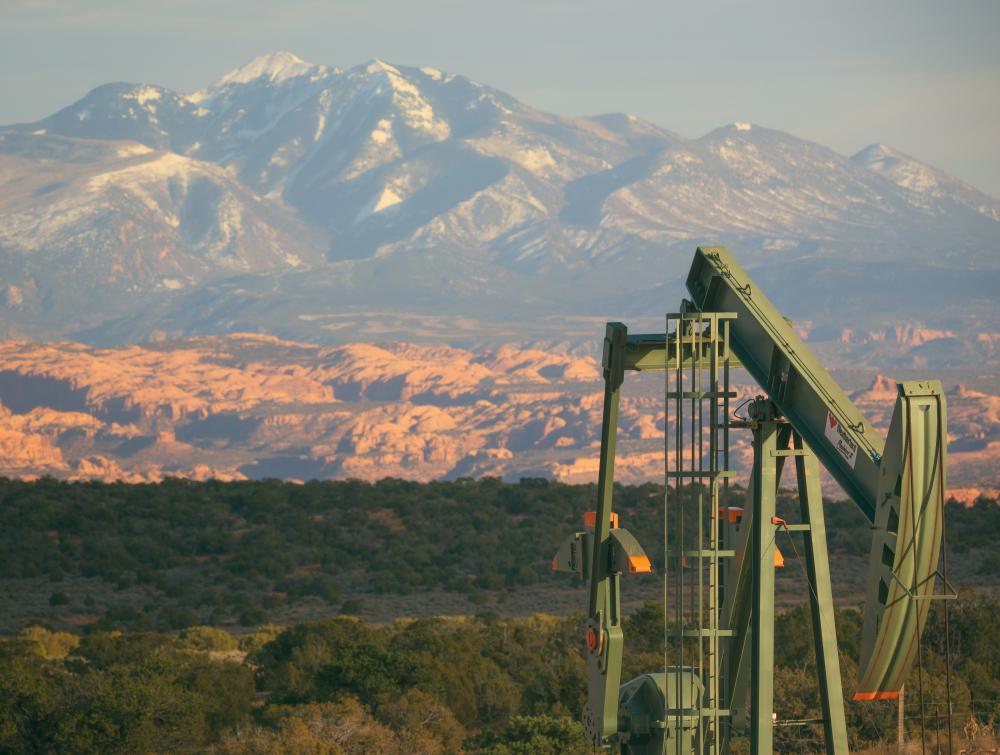Land hoarders: Oil and gas companies are stockpiling your public lands

Oil well seen from just outside the entrance to Canyonlands National Park, Utah
Mason Cummings, The Wilderness Society
For decades, the oil and gas industry has squatted on large tracts of public lands without paying royalties or allowing Americans access, but now is the time for reforms, according to a new report.
The report (PDF) from The Wilderness Society explains how the oil and gas industry routinely exploits leasing loopholes known as “suspensions,” to stockpile leases that would otherwise expire due to lack of use.
These loopholes allow the industry to take lands off the books for decades at a time, preventing Americans from using them for recreation and conservation, and other companies from developing them.
In total, the oil and gas industry holds 3.25 million acres of lands in limbo—that’s nearly the size of the state of Connecticut.
Even more alarming is that under suspended leases, oil and gas companies oftentimes pay neither royalties nor rent, while our shared public lands are closed off to the public for any other use.
Oil and gas companies can ask the Bureau of Land Management (BLM) to suspend leases at any time, and their requests are almost always granted. This system is just one more example of oil and gas companies running the show on our public lands without enough oversight from the government or the public.
In our report, we explain how the BLM has failed to actively manage and monitor suspended leases to ensure that suspensions are lifted as warranted.
The agency must take immediate action to address these problems and ensure that land that belongs to all Americans is not kept off limits by oil and gas companies who have more land than they know what to do with.
Abuse of a well-intentioned law
Current law allows oil and gas leases on public lands to be “suspended”—effectively put on hold—ensuring the leases do not expire even while companies are not paying rent. The typical lease term is ten years, but some leases have been under suspension since as far back as the 1960s.
Suspensions can be a necessary tool that allows for things like environmental review of proposed development, but the BLM’s current approach to granting them is flawed. The agency has been granting suspensions without properly reviewing the need for them, and the problem continues to grow.
Congress intended for leased lands and minerals to be developed to generate energy and income for the benefit of the public in a timely manner. Where development is not actively pursued, leases were to expire so the lands could be subject to other uses.
Leases suspensions were never intended to remain in place for decades, or to give a lifeline to oil and gas companies who neglected to develop their leases, but now oil companies are suspending their leases and squatting on the land far beyond the terms of their leases. This undermines Congressional intent for active development of leased lands.
Millions of acres of public land in limbo due to no oversight
The BLM routinely grants lease suspensions, in many occasions for questionable reasons. These improperly granted leases then go unmonitored, largely forgotten.
By law, oil and gas companies are required to actively pursue development on leased lands and pay royalties for the income generated from taxpayer-owned resources.
The presence of oil and gas leases, regardless of whether the leases are or ever have been in production, is often cited to justify the BLM’s decisions not to manage lands for conservation or other values.
Our research has identified the sources of the problem:
- Suspensions are granted when they are not justified
- Once suspensions are in place, they are not actively monitored or reviewed, leaving inappropriate suspensions in place
- The BLM usually does not disclose the initial suspensions or status, so there is no public oversight or tracking to serve as a check on the agency and industry actions
State-by-state breakdown of suspended acres
As of April 2015, a total of 3.25 million acres of federal leases are held under suspension. That’s nearly 10 percent of the total federal land currently under lease by the oil and gas industry.
Of those 3.25 million acres, 30 percent have been in suspension since before 1990. The data indicate leases frequently remain in suspension well after the circumstances that originally justified the suspensions have been resolved.
Closing the loophole that allows oil and gas companies to hoard public lands
Looking at some of the 3.25 million acres of lease lands under suspension, our research found many of these suspensions were not justified yet lasted decades. Currently, it’s too easy for oil and gas companies to get leases into suspension and to keep them there.
We have identified immediate actions the government can take to begin to resolve this problem:
- The BLM should review and lift suspensions on all leases where there are not valid reasons to continue suspension
- Congress should request an investigation to identify and recommend a remedy to the underlying problem
- The BLM should issue new policy and training to guide future lease suspensions and ensure suspensions are only granted when truly needed and managed to ensure they end in a timely manner
- The BLM should increase transparency and opportunities for public involvement in lease suspensions and monitoring
